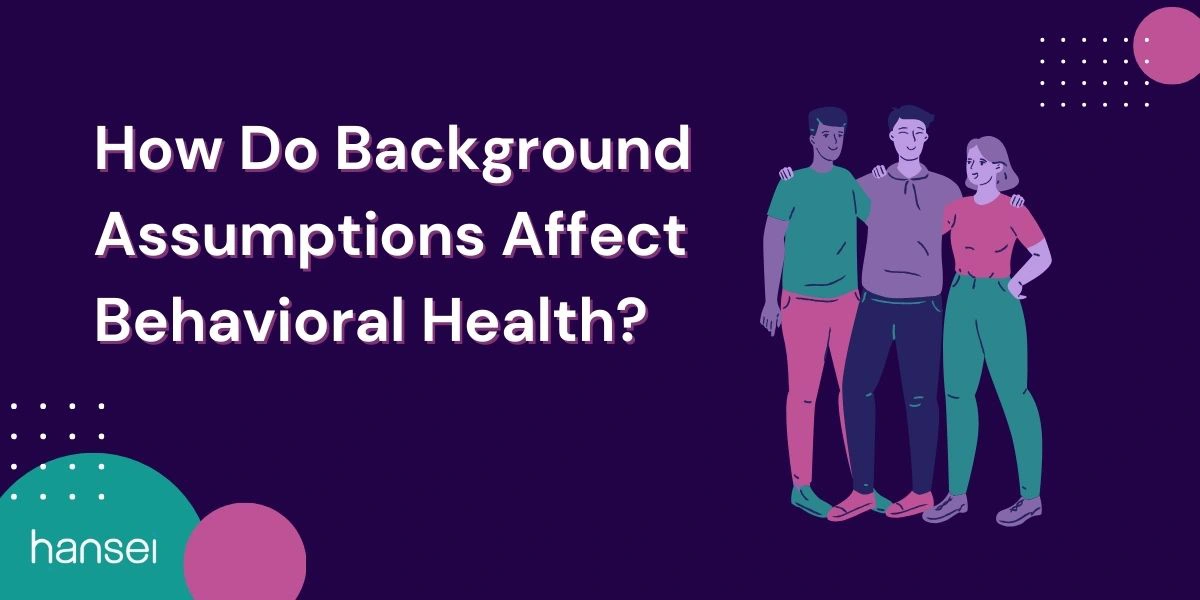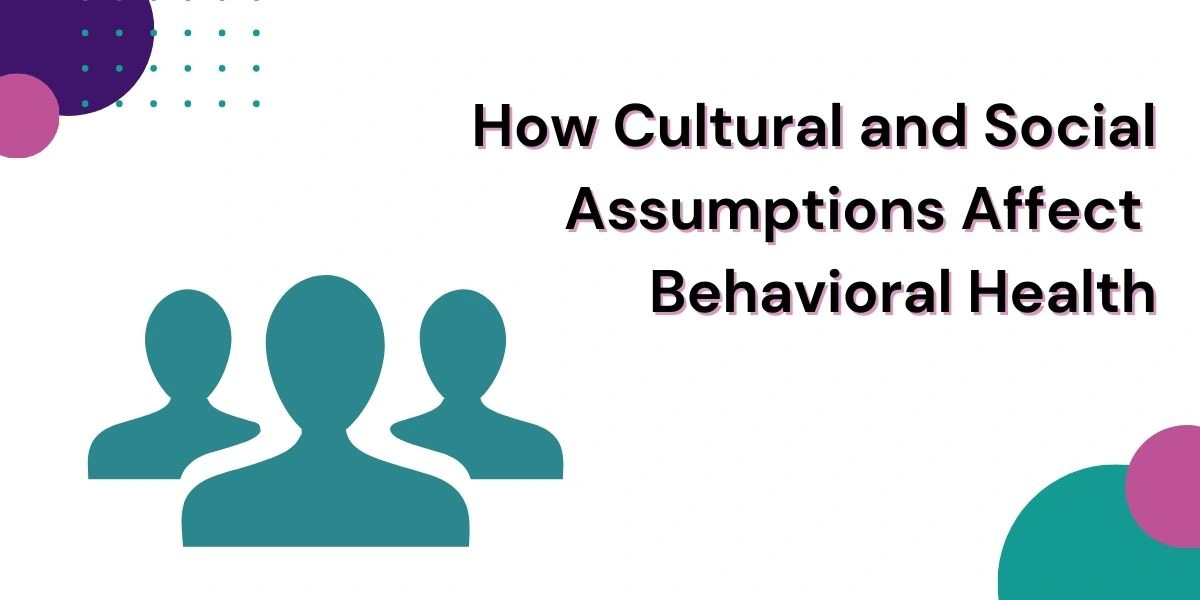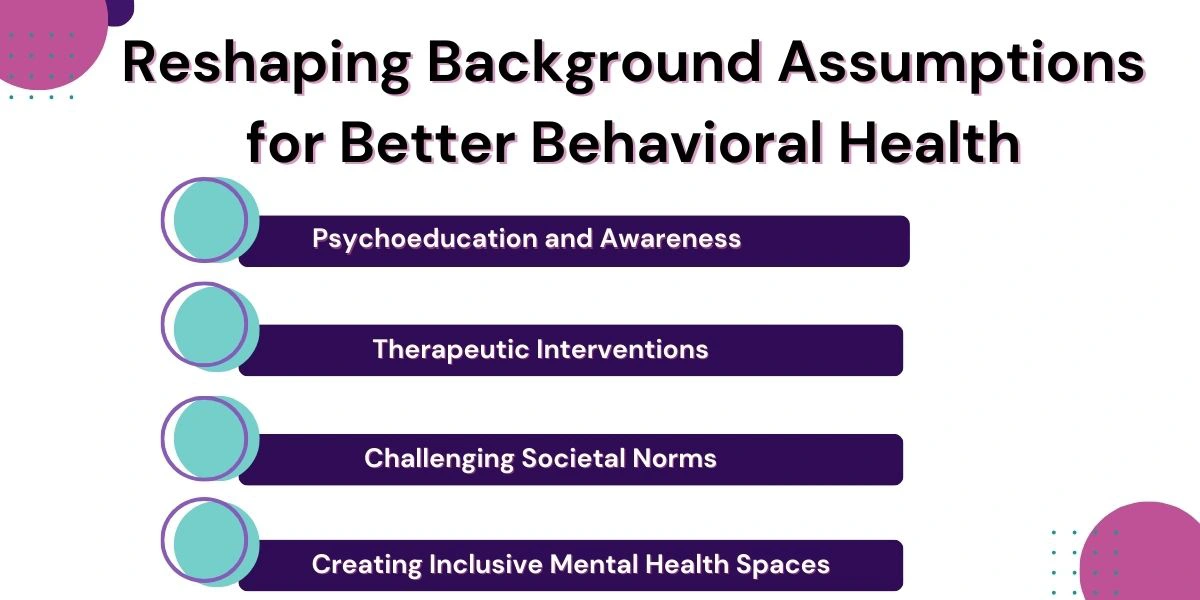Blog

Our thoughts, behaviors, and emotional responses are shaped by the assumptions we make about ourselves, others, and the world around us. These background assumptions—deep-seated beliefs that operate beneath conscious awareness—significantly influence behavioral health. Whether rooted in personal experiences, cultural conditioning, or societal norms, these assumptions impact how individuals perceive mental health challenges, seek treatment, and respond to therapy. Understanding these influences is crucial for improving mental health outcomes and developing more effective treatment approaches.
The Role of Background Assumptions in Mental Health
Background assumptions are foundational beliefs that develop from family upbringing, cultural influences, and personal experiences. These assumptions influence how individuals perceive mental health disorders, their attitudes toward therapy, and their coping strategies. For example, someone raised in an environment where emotional struggles were dismissed may internalize the belief that seeking therapy is unnecessary or weak.

How Cultural and Social Assumptions Affect Behavioral Health
Cultural and social assumptions play a significant role in shaping how individuals perceive and respond to behavioral health challenges. Beliefs about mental health, substance use, and treatment vary widely across communities, influencing everything from stigma and access to care to coping mechanisms and support systems. Societal norms and cultural expectations can either encourage open discussions about mental well-being or create barriers that prevent individuals from seeking help.
Stigma and Mental Health Treatment
One of the most significant ways background assumptions affect behavioral health is through stigma. Societal attitudes toward mental illness shape whether individuals seek treatment and how they perceive their own struggles.
According to the National Alliance on Mental Illness (NAMI), nearly 50% of individuals with a mental health disorder do not seek treatment due to stigma. A study even found that stigma-related barriers reduce the likelihood of seeking treatment. When mental illness is viewed as a personal failing rather than a medical condition, those struggling may avoid seeking help, exacerbating their symptoms.
Gender and Mental Health Assumptions
Background assumptions about gender play a significant role in shaping mental health behaviors. Men, for instance, are often discouraged from expressing vulnerability, leading to reluctance in seeking professional help.
Research from the American Psychological Association (APA) found that men are significantly less likely to seek mental health treatment than women, despite experiencing high rates of depression and suicide. The Centers for Disease Control and Prevention (CDC) further reports that suicide rates for men are nearly four times higher than for women. This reluctance often results in unhealthy coping mechanisms, such as substance abuse, further worsening mental health conditions.
Racial and Ethnic Disparities in Mental Health
Assumptions related to race and ethnicity also affect behavioral health outcomes. Historical mistrust of medical institutions, cultural perceptions of mental health, and systemic barriers contribute to disparities in access to care.
The Substance Abuse and Mental Health Services Administration (SAMHSA) reports that Black and Hispanic individuals are less likely to receive mental health treatment than White individuals, even when experiencing the same levels of distress. Native American communities experience the highest rates of mental health disorders but face significant barriers to accessing care.
Addressing these disparities requires a shift in assumptions about who deserves care and an expansion of accessible mental health services.
The Psychological Impact of Background Assumptions
While some background assumptions provide a sense of stability and identity, others can reinforce biases, limit personal growth, or contribute to stress and anxiety. Recognizing and challenging these underlying beliefs is essential for fostering self-awareness, improving mental health, and promoting more adaptive ways of thinking.
Self-Fulfilling Prophecies
Background assumptions can shape self-perception, often leading to self-fulfilling prophecies. If someone believes they are “not the type of person” who benefits from therapy, they may not fully engage in treatment, limiting its effectiveness.
A study in found that individuals with negative self-perceptions of mental illness were more likely to drop out of treatment early. This highlights the importance of reshaping negative beliefs about mental health care.
Cognitive Distortions and Mental Health
Cognitive distortions—irrational thought patterns that reinforce negative beliefs—are closely tied to background assumptions. Cognitive-behavioral therapy (CBT) helps individuals recognize and reframe these assumptions, leading to improved mental health outcomes.
Examples include:
- All-or-nothing thinking – Believing that anything less than perfection is a failure.
- Overgeneralization – Assuming that one negative experience defines all future experiences.
- Catastrophizing – Expecting the worst possible outcome in every situation.

Reshaping Background Assumptions for Better Behavioral Health
Reshaping background assumptions is a critical step in improving behavioral health, as deeply ingrained beliefs often shape how individuals perceive themselves, others, and mental well-being. Challenging outdated or harmful assumptions can help break down stigma, encourage help-seeking behaviors, and foster a more supportive environment for mental health and addiction recovery.
1. Psychoeducation and Awareness
Understanding how background assumptions shape behavior is the first step in addressing them. Mental health professionals can help clients identify their implicit beliefs and challenge their validity. Research shows that psychoeducation programs improve treatment adherence and reduce stigma-related barriers to seeking help.
2. Therapeutic Interventions
Therapies like cognitive-behavioral therapy (CBT) and acceptance and commitment therapy (ACT) effectively reshape negative assumptions. A meta-analysis found that CBT is one of the most effective interventions for changing maladaptive thought patterns.
3. Challenging Societal Norms
Advocacy and education campaigns play a crucial role in shifting harmful societal assumptions. Initiatives like Mental Health First Aid and anti-stigma movements encourage open conversations about mental health and promote help-seeking behaviors.
4. Creating Inclusive Mental Health Spaces
Healthcare providers must ensure that mental health services are culturally competent and accessible. Community-based interventions, language-inclusive resources, and trauma-informed care models help bridge gaps in mental health treatment.
Changing the Narrative for Better Mental Health
Background assumptions play a fundamental role in shaping how individuals perceive mental health, whether they seek treatment, and how they respond to therapy. While some assumptions can be beneficial, others contribute to stigma, reinforce disparities, and create barriers to care.
By increasing awareness, implementing evidence-based therapeutic interventions, and fostering inclusive mental health care systems, we can challenge harmful assumptions and create a more supportive environment for individuals struggling with mental health issues. Changing the narrative starts with recognizing these deep-seated beliefs and working collectively to foster a culture of acceptance and support. Let Hansei Solutions help your practice by streamlining the billing process to allow you to spend more time doing what you love – working with your clients.

Ready to focus on providing healthcare? Let us lighten your load.
We’re here to address your pain points and create growth opportunities for your organization. We’re passionate about what we do, and it shows in every interaction. Learn what makes us tick and schedule a demo today.